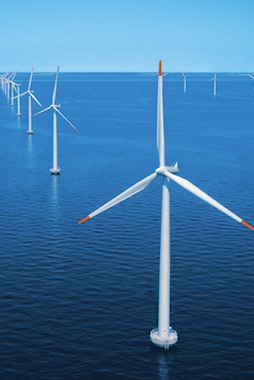Workshop: Offshore Wind Energy
 Offshore wind parks have been a key driver for MSP as they represent a new place-based infrastructure, often in competition for space with other uses. It is predicted that in order to produce 25,000 MW of electricity in 2030 through offshore wind, approximately 65-70 wind parks. This is expected to require up some 3,500 km2 of Baltic Sea space. Despite these figures, no comprehensive mapping of existing or planned marine wind energy parks exists for the BSR and discussions have mainly taken a national rather than a pan-Baltic perspective.
Offshore wind parks have been a key driver for MSP as they represent a new place-based infrastructure, often in competition for space with other uses. It is predicted that in order to produce 25,000 MW of electricity in 2030 through offshore wind, approximately 65-70 wind parks. This is expected to require up some 3,500 km2 of Baltic Sea space. Despite these figures, no comprehensive mapping of existing or planned marine wind energy parks exists for the BSR and discussions have mainly taken a national rather than a pan-Baltic perspective.
Title: Marine spatial planning as a tool for coherent offshore wind energy development in the Baltic Sea Region
Date: 12-13 November 2013
Location: Vilnius, Lithuania
Host: German Federal Maritime and Hydrographic Agency (BSH)
Contact: Bettina Käppeler
Downloads: Agenda, Summary report
Background:
- Introducing and promoting renewable energies from marine sources and space is being widely acknowledged as effectively contributing to fight climate change and reduce negative environmental impacts of traditional energy sources.
- Offshore wind energy has been given high priority from politics in many countries, with respective national targets announced, respective industry and infrastructure evolving.
- Offshore wind energy has recently been and will become even more of a major driver for starting to regulate the use of marine space beyond traditional and/or international regulations focusing on fisheries, shipping and cable/pipeline laying or nature protection.
- Many problems have to be addressed, such as identification of appropriate marine areas for the turbines and cable connections, considering coastal infrastructure and grid integration.
- Looking beyond national boundaries and having in mind the Baltic Sea as a common asset of its bordering countries, the discussion shall focus on if and how there might be a common approach to use sea space for the production of renewable energy and thus contributing to a stronger integration of the energy markets and reducing the dependency on fossil and nuclear energy sources.
Objectives:
- Strengthen the importance of addressing offshore wind energy planning in the spatial context at the Pan-Baltic level.
Topics for discussion:
- Maritime Spatial Planning: Principles
- Offshore Wind Energy and Marine Spatial Planning : Current status and perspectives in the Baltic Sea region
- Examples of the offshore wind planning (licensing, regulations)
- Planning of the energy grid network in the Baltic Sea Region
- Future Baltic marine spatial planning vision for the offshore wind energy:
- Expectations of the wind energy industry towards MSP (offshore wind farms and transmission networks)
- Potential conflicting sectors and synergies
- Ways for MSP at Pan-Baltic level to support the development plans of the wind energy sector / National versus pan-Baltic planning
Additionally, the participants were able to contribute to the poster exhibition with plans, maps or project presentations (MSP activities in the BSR, activities in the field of offshore wind energy development, energy grid, technology, conflicts with other interests, etc.)
Presentations:
- PartiSEApate: Introduction to the project and the series of sectoral MSPT stakeholder workshops - K. Veidemane, Baltic Environental Forum (Latvia)
- BaltSeaPlan Vision 2030: Towards sustainable planning of Baltic Sea space – Angela Schultz-Zehden, s.Pro (Germany)
- Study on blue growth, maritime policy and the EU Strategy for the Baltic Sea Region – A. Schultz-Zehden, s.Pro (Germany)
- Offshore energy and maritime spatial planning in the German EEZ – Bettina Käppeler, BSH (Germany)
- Spatial offshore grid plan Baltic Sea – A. Hunke, BSH (Germany)
- Offshore wind energy activities in Poland – M. Witonski, Polish Offshore Wind Energy Society (Poland)
- Havvind: Offshore wind power in Norway – A strategic environmental assessment – C. Kvamme, IMR (Norway)
- Regional OWE planning in the context of LT MSP – N. Blаžauskas, CORPI (Lithuania)
- Sectoral marine planning for offshore renewable energy in Scotland - A. Kafas, Marine Scotland (UK)
- Planning and spatial critieria for offshore wind farm projects and grid planning in Swedish waters – H. Ohlsso, WPD (Sweden)
- Co-use of offshore wind farms sites: A case from Lolland/Denmark - P.B. Christensen, LOKE, Green Center (Denmark)
Recommended reading:
- BaltSeaPlan Vision 2030 (available in English, Latvian, and Estonian)
- BASREC-wind: Final Report “Conditions for Deployment of Wind Power in the Baltic Sea Region“
- German Maritime Spatial Plan for the Baltic Sea EEZ
- EU Strategy for the Baltic Sea Region – Action Plan (see Priority Area “Energy”)
- TYNDP 2014 – ENTSO-E – Baltic Sea Regional Stakeholder Workshop, presentations on Ten-Year Network Development Plans (e.g. presentations 2 and 3)
- Windspeed Project: Roadmap to the deployment of offshore wind energy in the Central and Southern North Sea (2020-2030)

